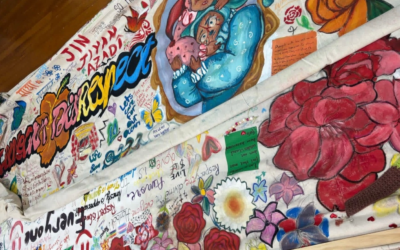On 7 August 2025, Western Sydney University students and staff were encouraged to exchange free items to meet their material needs at the University’s Parramatta South Campus. ‘We’re trying to build a community on campus that reduces waste, creates social infrastructure for exchange and encourages sustainable practices’, said Festival of Action organiser Dr Jenna Condie, of the clothes and resource swap.
Dr Condie aims to boycott fast fashion with initiatives like the Festival of Action and in organising the swap. American writer and journalist Alyssa Hardy wrote for Vogue that defining fast fashion as the rapid process of designing, manufacturing and distributing cheaply made garments that copy the latest fashion trends. Hardy reported that fast fashion’s popularity can be attributed to the fact that consumers can participate in fashion trends at a low price during an economic crisis.
‘The affordability of fast fashion makes it easier to purchase clothes in a cost-of-living crisis’, said Fatmah Al Shamri, a Western student who has purchased fast fashion. ‘Purchasing from fast fashion retailers would be convenient for consumers who… participate in fashion trends regularly’, said Al Shamri.
Earth.org, a sustainability organisation, shared that fast fashion’s rapid production positions garments as disposable, contributing to textile waste and environmental pollution. The organisation reported that filling landfill with cheap garments and non-biodegradable fibres releases harmful microplastics into the environment. Fashion and arts student Charlie Kosmic said: ‘Microplastics end up in our waterways and choke our fish’, echoing growing sentiment of concern on fast fashion’s environmental impact.
Hardy revealed that fast fashion supply chains subcontract work from factories worldwide, opting for cheaper labour. She reports that workplace safety is disregarded, despite factory workers reporting exploitation and infrastructure safety issues. For example, the 2013 Rana Plaza garment factory collapse in Bangladesh, which killed 1,134 workers.
At the Swap, Dr Hally Kaye-Smith hosted a ‘How & why we can wash clothes less’, panel, demonstrating how to keep clothes clean using ‘eco-refreshing’ without relying on a washing machine.
Kenyan-born community organiser and storyteller Wanyika Mshila hosted the ‘Tied in History: The Art & Resistance of Headwraps’, workshop, focusing on the significance of African headwraps.
According to @wsustudentlife on Instagram, the Swap succeeded in redistributing 230.45 kilograms of clothing. Looking to the future, Dr Condie said she’ll aim to ‘curate stuff that people need when they come to the Swap’.



